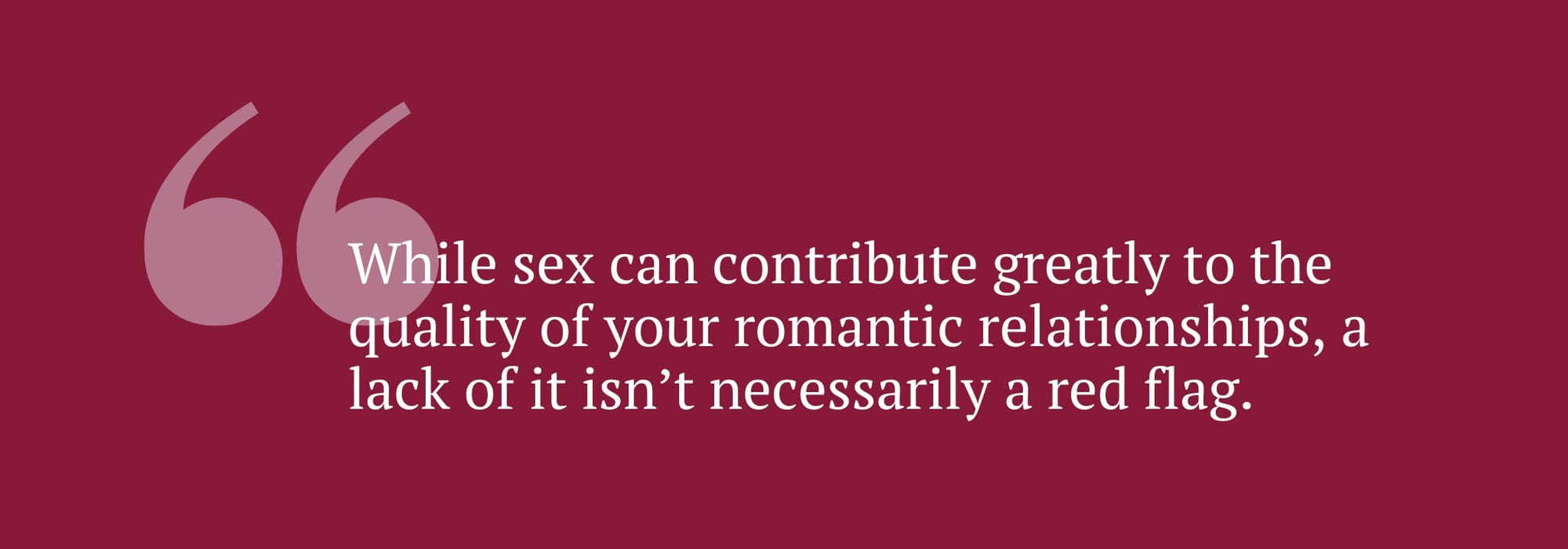Many of our beliefs about sex are ill-informed, rumour-fuelled, or just plain wrong – so let’s put them to bed…
I love talking to my friends about sex. Not because I want to gossip, or compare myself, but because for a big part of the first 35 years of my life I was disconnected from my sexual desires. I was sexually active for some of the time, but I was hiding my queerness behind the false façade of a straight, married woman.
Thankfully, I came out a few years ago, and with that awakening came a newfound joy in sexual pleasure, along with a sense of liberation – finally, I could talk openly about sex without the fear of shame.
With that said, reconnecting with my sexuality has forced me to examine my misconceptions about intimacy. From unrealistic expectations about frequency to narrow definitions of what constitutes ‘real’ sex, these false beliefs can have a significant impact on our health, and our relationships. That’s why I’m sharing six myths about sex that deserve debunking.
MYTH 1: The average couple has sex three times a week
There’s no rulebook for how much sex you ‘should’ be having on any given week, and according to psychodynamic psychotherapist Ilias Bloomfield, this idea keeps people focused on quantity over quality.
In aiming for a specific target, you could set yourself up to fail. “It’s reasonable to ask yourself if it’s even possible to be having sex three times a week with your current schedule, life commitments, family obligations, and other responsibilities,” says Ilias. “Sex is still super important and healthy for our relationships, and establishing what feels right for you and your partner is crucial, rather than trying to have a one-size-fits-all approach.”
After all, sex shouldn’t be about ticking a task of a to-do list, but, instead, about connecting on a deeper level.
MYTH 2: Sex only ‘counts’ if there is penetration and orgasms
Whether it’s what we’re taught in school, heteronormative scenes of intercourse on TV, or examples from porn, the idea of sex has become synonymous with penetration and orgasms. But this limited definition of sex means that many of us are missing out on the full spectrum of pleasurable activities.
“It seems to me that we have lessons to learn from the LGBTQIA+ community when it comes to what counts as sex,” says Ilias, who notes that our western focus on procreation, penetration, and orgasms sets unrealistic expectations. “It’s not always possible to orgasm, and it’s not necessary for all intimate moments between you and your partner to lead to penetration.”
According to the National Survey of Sexual Health and Behaviour, men are more likely to orgasm when sex includes vaginal intercourse, whereas women are more likely to orgasm when they engage in a variety of sex acts, suggesting that differing needs and preferences are completely normal.
“For a lot of people, oral sex, kissing, or other intimate acts can be as important as penetrative sex, so we shouldn’t forget about the importance of intimacy,” says Ilias. “Intimacy should be defined between you and your partner, and be about your individual needs, and what makes you feel pleasure and enjoyment.”
MYTH 3: You can’t get an STD from oral sex
Sexually transmitted diseases (STDs) affect more than 400,000 people in Britain, and data from the UK Health Security Agency suggests that this figure is rising. The associated stigma means that conversations around safety and protection are often shrouded in mystery.
“You can get and give an STD from oral sex, and not many people realise this,” explains Ilias. “Chlamydia, gonorrhoea, syphilis, and other infections can be transmitted orally, but I would like to emphasise that there is little to no risk of getting or transmitting HIV from oral sex.” Lower your chances of giving or getting an STD by using a condom, dental dam, or other barrier methods during oral sex, and schedule a yearly sexual health screening.
MYTH 4: Lesbians don’t need to practise safe sex
“The assumption that lesbians don’t need to practise safe sex is actually a very dangerous assumption,” says Roxy Bourdillon, author of What A Girl Wants: A (True) Story Of Sexuality And Self-Discovery. “People of all sexualities need to practise safe sex, and that includes lesbians.” As previously mentioned, STDs can be contracted from non-penetrative sex acts. So when it comes to women-on-women sex, it’s important to know that oral sex, genital contact, genital to body contact, and sex toys can all spread disease.

MYTH 5: No sex means the relationship is over
While sex can contribute greatly to the quality of your romantic relationships, a lack of it isn’t necessarily a red flag.
“I often hear stories of people who have fulfilling relationships in the absence of sexual gratification,” says Ilias. “For the majority of couples, relationships encompass more than just good sex – they encompass love, a blend of other crucial aspects such as safety, companionship, shared goals and aspirations, survival, and the act of coming together to create a tribe.”
Of course, some relationships do end after a period without sexual intimacy, but Ilias stresses that this is likely one of many contributing factors, rather than the sole cause. But it’s also OK if sex is an important aspect of relationships to you. “This is a question that may arise at some point in your relationship, and if sex holds such importance that it sustains your connection, you must confront this challenge together,” says Ilias. “If necessary, seek professional help to determine if this is just a temporary decline in sexual desire, or a deeper issue that can be resolved.”
MYTH 6: Bisexual people are just confused
Bisexual people have long been subjected to judgement and abuse regarding their sexuality.
“The idea that bisexual people are just confused is an outdated, biphobic stereotype that, sadly, I still hear today,” says Roxy. “It stems from a limited, binary way of thinking; the false belief that you’re either gay or straight, and there are no other options at all. This mindset doesn’t begin to reflect the reality of human sexuality, which is gloriously diverse.” The truth is that bisexual people have always existed, and their experiences with sex and intimacy are just as valid as everyone else’s.


Comments